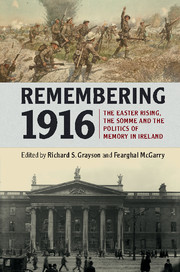Book contents
- Frontmatter
- Contents
- List of figures
- List of tables
- List of contributors
- Introduction
- Part I Memory and commemoration
- Part II Narratives
- Part III Literary and material cultures
- Part IV Troubled memories
- 11 Reframing 1916 after 1969: Irish governments, a National Day of Reconciliation, and the politics of commemoration in the 1970s
- 12 New Roads to the Rising: the Irish politics of commemoration since 1994
- 13 Ghosts of the Somme: the state of Ulster Loyalism, memory work and the ‘other’ 1916
- Index
11 - Reframing 1916 after 1969: Irish governments, a National Day of Reconciliation, and the politics of commemoration in the 1970s
from Part IV - Troubled memories
Published online by Cambridge University Press: 05 March 2016
- Frontmatter
- Contents
- List of figures
- List of tables
- List of contributors
- Introduction
- Part I Memory and commemoration
- Part II Narratives
- Part III Literary and material cultures
- Part IV Troubled memories
- 11 Reframing 1916 after 1969: Irish governments, a National Day of Reconciliation, and the politics of commemoration in the 1970s
- 12 New Roads to the Rising: the Irish politics of commemoration since 1994
- 13 Ghosts of the Somme: the state of Ulster Loyalism, memory work and the ‘other’ 1916
- Index
Summary
I
This chapter looks at Irish government efforts to control the politics of commemorating the 1916 Easter Rising after 1969. It begins by looking at how the Irish government dealt with the attempt by militant republicans to claim ownership through commemoration not merely of Irish republicanism and the memory of the Rising, but the Irish Republic as it existed in state form. The dramatic particularities of the Provisional Sinn Féin Commemorations of 1976 in Dublin and Belfast have been looked at elsewhere. Here, the focus is on commemoration as a component of the northern policy of the 1973–1977 Fine Gael–Labour coalition government and, secondly, on Fianna Fáil's analysis of this policy in 1978 and its decision effectively to retain it. Material hitherto not in the public sphere illuminates the northern policy of the coalition government, and the important, if not pivotal, role of Conor Cruise O'Brien in formulating commemorative policy, particularly through the new National Day of Reconciliation, later designated a National Day of Commemoration, which was designed to replace all other government commemorative events. The chapter concludes that, although reframing 1916 within St Patrick's Day in this manner was never a popular success, it nonetheless acted as a bridge into a very low-key commemorative acknowledgement of 1916, a policy that endured arguably until 2006. Though it is acknowledged that the commemorative policy of the Irish government was ideologically linked to wider security policies, they are not explored here. New British counter-insurgency policies in Ulster after 1975 facilitated new popular mobilisation and new commemorative practices in ‘the North’, as republicans insisted on utilising the pantheon of Irish commemorative dates. Though commemoration is always protean, fugitive and resistant to state control, the lesson of the mid-1970s is that Irish governments could, through the state apparatus, partially refashion public norms in relation to commemoration. This was not possible in ‘the North’. In this sense, northern nationalist commemorations of 1916 had their own, often factional, dynamics; they drew on shared ‘Irish republican’ cultural capital in radically different ways. Northern nationalist commemoration, whether in 1966 or 1976 or now, is not an offshoot of southern actions or conceptualisations. So, although the commemoration policies of the Irish government were partly articulated in the language of not encouraging northern violence, their real success was in reshaping the public culture of the ‘little platoon’ of the Irish state.
- Type
- Chapter
- Information
- Remembering 1916The Easter Rising, the Somme and the Politics of Memory in Ireland, pp. 207 - 223Publisher: Cambridge University PressPrint publication year: 2016
- 2
- Cited by



